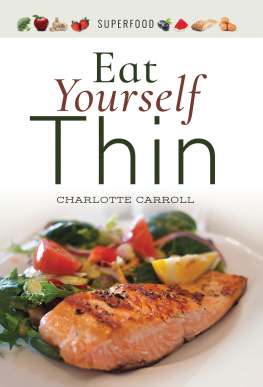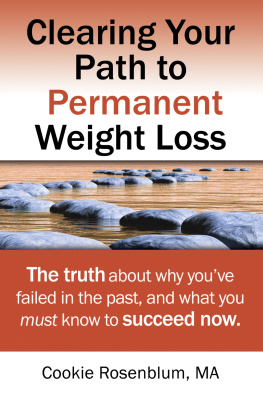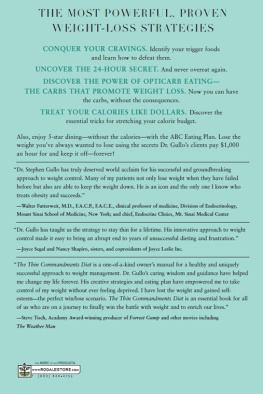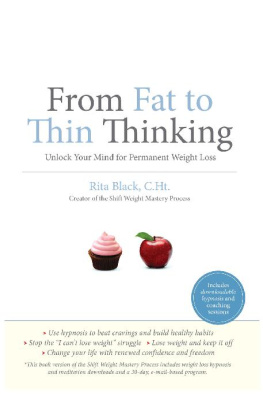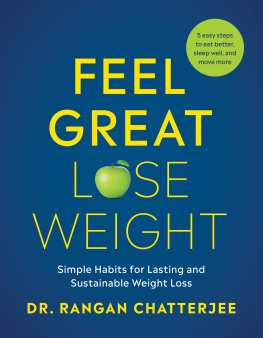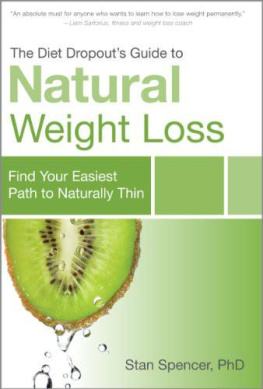THIN FROM WITHIN

CONTENTS
ACKNOWLEDGMENTS
I begin with my patients and all the wonderful people who have joined my Self-Coaching community at www.selfcoaching.net. I want to thank you allnot only for your ongoing support but for becoming the source of encouragement for this book.
Id like to thank my agent, Linda Konner, for her unwavering faith and guidance in this project. Where others insisted that readers only wanted gimmicks and quick fixes, Linda had the foresight to recognize the potential for a legitimate, psychological approach to weight loss. Linda, more than anyone else, is the reason you now have this book.
Special thanks and appreciation go to my editors at AMACOM, Bob Nirkind and Alison Hagge.
From the start, Bob has shown confidence in me and this project. No question, Ive been in good hands with Bobs extraordinary perceptiveness and literary instincts. His guidance and encouragement have made this process seamless from the start. I am eternally grateful to Bob and to AMACOM for both the opportunity and the support they have generously shown me.
Alisons editorial input, enthusiasm, and encouragement have been nothing less than inspirational. Her unique ability to morph herself into the psyche of my writing is quite remarkableand comforting! I feel very fortunate to have had the opportunity to work with her on this project.
A special thanks goes to Jane Rafal Wilson. Jane and I have worked together from the start of my Self-Coaching career, which now spans almost two decades. Her unwavering support, encouragement, and friendship have been a major reason why I continue to write. Janes editorial expertise has continued to point me in the right direction. There were times when doubt, frustration, or confusion led me to falter, but Jane always resurrected my confidence. As grateful as I am to be able to call her my literary coach, Im blessed to be able to call her my friend.
INTRODUCTION
When I was growing up in the 1950s, unless you were training for a prizefight, no one belonged to a gym, no one ran or even heard of a marathon. Yoga was regarded with suspicion as an arcane cult, Weight Watchers hadnt hit the scene, and Nikes first running shoe was still more than two decades away. All thats changed. Today weve become obsessed with getting in shape, looking and feeling great, and pushing the envelope of our active lives. Just ask Fauja Singh, the Turbaned Torpedo, who in 2011 (at age 100) completed the 26.2-mile Toronto Marathon.
Unfortunately, as determined as we are about our exercising, we still havent solved the obesity problem in our country. In fact, its gotten worse. By some estimates, the bleak reality is that more than 80 percent of people who diet and lose weight regain that weight within two years. As youve probably discovered, exercise alone just isnt enough to stop the battle of the bulge. I found this out the last time I ran in the New York City Marathon. I couldnt believe how many potbellied finishers there were. According to the US Centers for Disease Control and Prevention, 33 percent of American adults are overweight, 35.7 percent are obese, and 6.3 percent are extremely obese. Considering that more than $30 billion is spent each year on gym memberships, diet books and plans, and weight-loss products, you would think we would be a leaner, more fit society.
So whats going on? Well, unfortunately, as well intentioned as we are, collectively were missing the point. When it comes to permanent weight loss and lifelong weight mastery, your mind, not your mouth, is the problem. Most diet programs casually address this issue by offering superficial motivational one-liners and aphorisms. Pep talks may well encourage you to fight the good fight, but nowhere is there a legitimate, psychologically based method that truly changes the way you think and react to cravings, impulses, and addictionsnot until now. Thin from Within: The Powerful Self-Coaching Program for Permanent Weight Loss is different. By changing your psychology regarding eating, you learn to replace old, destructive, self-sabotaging habits with an empowered mindset capable of building confidence and self-discipline. The bottom line is that unless you change your mind, it doesnt matter how much weight you lose, how many crunches you do, or how many miles you run, you will almost surely regain the weight you lost.
I wrote this book for two reasons. The first had to do with curiosity. I wanted to know why having good intentions simply isnt enough when it comes to changing destructive eating habits. Why seemingly disciplined women and men can successfully manage every other aspect of their lives (including regular exercise), and yet when it comes to defeating destructive eating, they appear helpless and lost. And I wanted to be able to offer my patients and readers the psychological tools and insights necessary to liberate themselves from the compulsivity of destructive eating.
The second reason I wrote this book was because I wanted to share what Ive learned from my own emotional struggle with food. To be clear: I was never overweight, and I didnt suffer from destructive eating habits. But I did have a slight blockage in one of my arteries, and my cardiologist gave me the option of having a stent implanted or significantly changing my lifestyle. To me this was a no-brainer: I would change my already relatively healthy lifestyle by going hard core. After considerable research (and having had the good fortune of consulting with Dr. Joel Fuhrman about his nutritarian approach to health), I chose a mostly vegan way of life.
Vegans eat no animal protein (no meat, chicken, eggs, or dairy). I do, however, have a piece of omega-rich fatty fish once in a while. (Self-Coaching does not espouse any dietary regime; I use my situation only as an example.) Worried as I was about the blockage in my artery, I extended my list of no-nos to include salty, fatty, and sweet snack foods. I also eliminated most wheat products because triglycerides were a problem for me. (What, no pasta? But Im Italian!) Essentially my diet consists of veggies and fruit.
I knew all of the logical reasons why I was embracing this new regime. However, when I actually started to put theory into practice, my first reaction to my new lifestyle was panic: No one can do this! Nevertheless, I knew that in order to avoid the possibility of invasive surgery, I had to at least try.
Eating essentially nothing but veggies and fruit presented many obstacles, both psychological as well as logistical, since more than 70 percent of the typical supermarket shelves are stacked with unhealthy processed foods, not to mention the meat or dairy sections. In short, shopping, preparing, and planning meals are no small matters for a vegan. So I struggled. Especially challenging moments for me included sitting at a restaurant with my wife and watching someone slice into a juicy Chateaubriand or smelling the ribs, burgers, and hot dogs on the grill at a tailgate party with my brother-in-law.
For a long time I felt that food was the enemy, forcing me to take evasive action whenever I was invited to restaurants, cookouts, and parties. However, its been a few years since I changed my lifestyle, and the slight blockage in one of my arteries has shown no progression (and some regression), and my high cholesterol, triglycerides, and glucose are all in the past. You might be tempted to say I had a significant incentive not to stray from my intentions, and you would be right. However, in spite of my incentive, during those early months of habit re-formation, I still had to grapple with sabotaging emotions, urges, and cravings.
Next page

